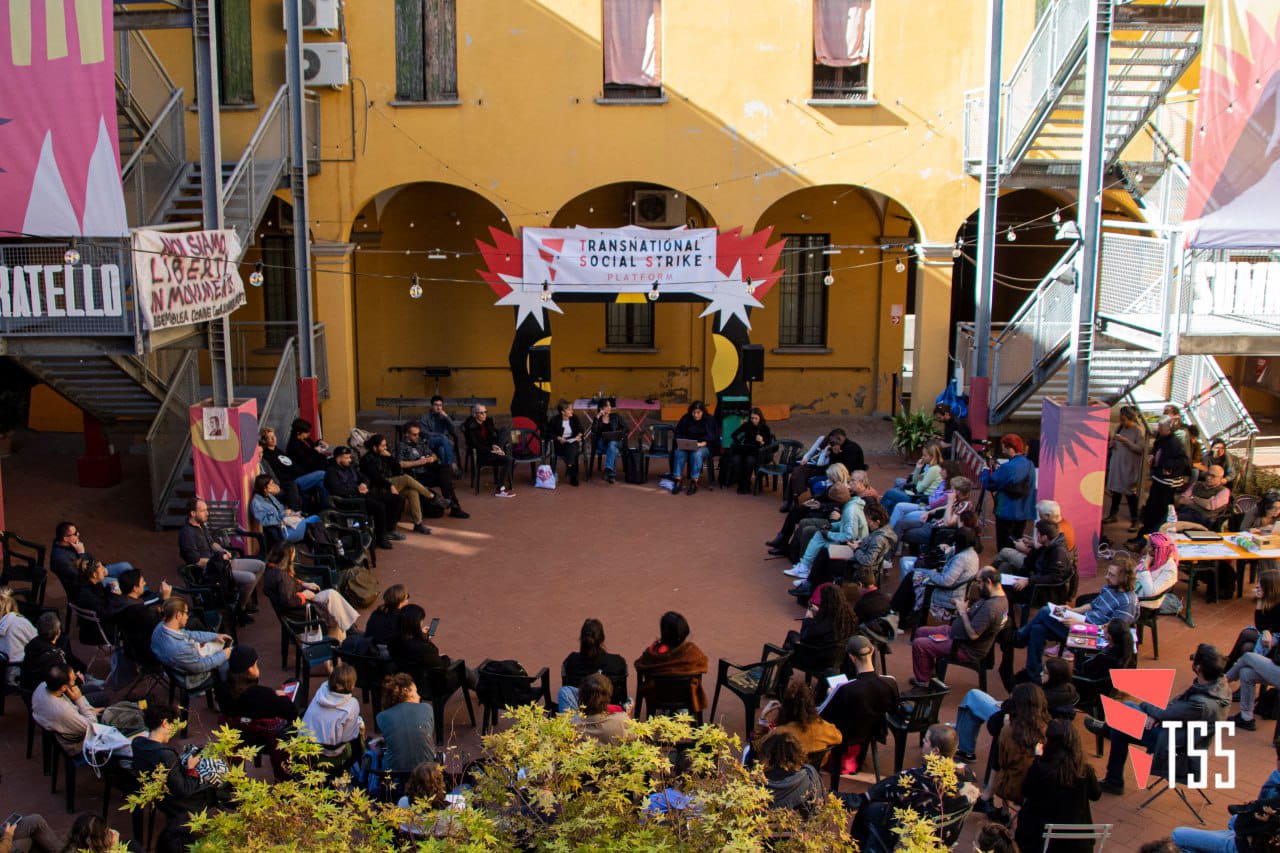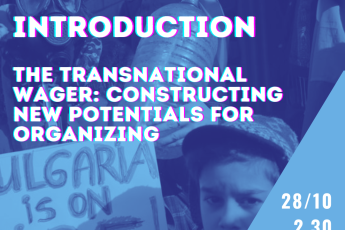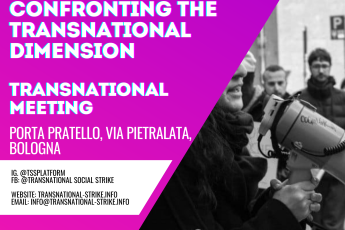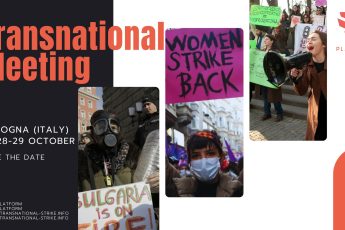
by TSS PLATFORM
Translations: Greek – Italian – German – Spanish
From the 27 to the 29 of October, 2023, around two hundred people from over 20 countries, most of them from within Europe, but also from beyond the EU, have joined the 10th TSS meeting, Breaking the Barrier, in Bologna. The meeting followed a path that started after the pandemic with the meeting in Sofia, and passed through the meeting in Frankfurt. The one in Bologna has been the third TSS meeting in less than one year, signaling a growing engagement within the TSS Platform and the recognition of the fundamental challenge of transnational organizing. In each meeting new people approached the TSS, while an increasingly consistent number kept following it meeting after meeting, drawing the contours of a collective process. For three days, we have discussed together about the opportunities and challenges of organizing our struggles transnationally against war politics, patriarchy, institutional racism and labour exploitation. We acknowledged the difficulties of keeping together struggles from so many different contexts, but we have also recognized the opportunities of transnational organization in making this process real and ongoing. This text summarizes the main aims and the next steps for the TSS platform after the Bologna meeting.
We launched the meeting in Bologna saying that we want to “break the barrier” of national politics, the barriers that divide struggles, contexts, conditions, and forms of organizing. The barriers that make it difficult today to even imagine a radical transformation. We are part of the TSS platform as the space where to experiment new forms of communication and initiative on a transnational level to fight against exploitation and oppression. In our local realities we organize and struggle. But we recognize that our capacity to struggle is diminishing, and our claims rarely correspond to actual victories. We come from different experiences of struggle and different histories, but we are determined to develop the platform as the space where we can look for tools to overcome differences, fragmentation and hierarchies.
The commitment to expand the TSS platform has grown since we experienced the pandemic and the spread of the politics of war, together with a general shift to the right-wing of the global political spectrum and growing nationalism. We need a global revision of our tools so that we are not paralyzed and helpless when major disruptions happen, and major disorders erupt. We need to prepare ourselves not only to respond to unexpected events, but also to intervene in mass movements and mobilizations that go well beyond organized structures, unions, and collectives. We want to elaborate collectively new strategies of intervention that are up to the present times.
The political situation in which we act is shaped by transnational processes (climate crisis, transformations of labor relations and rights, war politics, patriarchal attacks and attacks to sexual freedom, regulations of migrants’ movement): the capacity to strike is impeded by transnational processes and our commitment is that of reinventing it on the same transnational level. This requires that we engage with comrades abroad, within the EU but also well beyond its borders, and that we think beyond our political structures to frame anew our claims and struggles.
We know that we don’t start from scratch and that there are ongoing struggles and movements that already hint well beyond local and national frameworks. In these we recognize that something different from what we are used to is happening in spite of all difficulties: movements of migrants across the borders; forms of labor organizing that go beyond the one workplace; anti-patriarchal struggles of women, queers and essential workers across the transnational chains of care; forms of refusal of the war that cross the national fronts; struggles against climate degradation that bridge the divide between social and ecologist claims. At the very center of the TSS platform there is the goal to be part of these transnational movements, to foster them and to develop our collective capacity to understand, recognize and “catch” the unorganized forms of refusal that crisscross societies.
The TSS platform started from the experiments of migrant, social and metropolitan strikes in the aftermath of the financial crisis. Coming from previous experiences of counter-summits and coordinated days of action, we recognized in those experiments of strikes a novelty that marked a new beginning. In the next years the strike became indeed a watchword of new social movements, such as the global feminist strike and the climate strike, together with strikes in warehouses in different countries and continents and other less evident forms of strike, such as migrants’ movements and forms of refusal of the war and its consequences. We recognized in these movements a clear sign that to organize it is not enough to detect an enemy, pick a date and call people to take to the streets. The problem of organization goes well beyond the problem of how to mobilize and we need to be able to also question our identities and methods in the process. The TSS Platform is a space where a collective and open discussion on how to act transnationally takes place, where we ask ourselves how we can intervene in existing struggles not randomly but to foster a transnational approach, where we shape and attempt readings that highlight the not always evident transnational relevance of ongoing struggles. Questions that need to be constantly asked and to which we need to formulate every time tentative answers with eyes wide open to the conflicts, tensions and novelties that shake our realities. There are no shortcuts and ready-made solutions if not those we find together in the construction bit by bit of our platform.
The TSS platform works on different projects that reach out to real movements that are already acting in the transnational dimension. They are projects engaging directly with strikes on the ground and fostering political communication across borders. They are also places where to experiment new forms of organization that give a practical shape to the platform. These projects reflect political terrains that the TSS assumes as crucial fields of struggle for the present and the next future:
“Transnational Migrant Coordination” (TMC): The founding of the Transnational Migrants Coordination (TMC) goes back to the migrant struggles against institutional racism that took place in France and Italy in spring 2020. The migrants and collectives involved in the TMC quickly recognised the need for transnational coordination to effectively tackle racist and violent border regimes and migration policies in Europe and beyond. The TMC now unites migrants and groups from numerous countries such as Italy, France, Spain, Germany, Belgium, Turkey, Morocco and Greece. They are united by the demand for a Europe-wide, unconditional and unlimited residence permit.
“Essential Autonomous Struggles Transnational” (E.A.S.T.) represents a collective primarily consisting of women, migrants, laborers, and activists. This network emerged from the challenges in social reproduction that were intensified by the Covid-19 pandemic crisis. The focus of E.A.S.T. is primarily in Eastern and Central Europe, as indicated by its name. However, it views this region as a segment of a broader, transnational arena of activism. The network’s goal is to spark new movements and strikes to combat exploitation, gender-based violence, and systemic racism. It aims to achieve this by linking current movements and creating a unified organizational space, which transcends the limitations and fragmentation of single social and labor initiatives at local and national levels.
The “Climate Class Conflict” (CCC) aims to unite workers, unionists and climate activists. The goal is to facilitate discussions on tackling the diverse impacts arising from the green and energy transition. The belief underpinning this initiative is that a movement encompassing both climate and class issues on a transnational level is essential to face the climate crisis without being blocked by the perspective of the looming catastrophe. This movement seeks to challenge the accumulation of green capital and advocate for social justice.
The “Permanent Assembly Against the War” (PAAW) is a project of activists and workers aiming to grow a collective discussion in the direction of a transnational politics of peace and initiatives of refusal of the logic of war. Following Putin’s invasion of Ukraine, we began monthly meetings to address the conflict. Our focus is on supporting those struggling for survival in both Ukraine and Russia, people affected by the war’s effects beyond the immediate region, those impacted by economic sanctions, refugees fleeing from this and other wars in search of a better life, and workers resisting exploitation and the use of the war as a pretext for worsening work conditions. We also stand with women and LGBTQ+ communities in their fight against patriarchal oppression. We made 1st of May a day of strike against the war, and for a transnational politics of peace. Additionally, we have issued a political manifesto opposing the war, as we believe it starkly highlights the necessity for a transnational approach to improve life and combat the violence, exploitation, and environmental degradation prevalent in today’s society. The re-inflaming of the war in Palestine and the ongoing prospect of the opening of new fronts make the need to develop a discussion that breaks the fronts of war each day more urgent: this is what the PAAW is made for.
The TSS Platform includes the TSS coordination. The TSS coordination should not be imagined as a “center” where decisions originate and then are “executed”, but as a structure that has the important task of ensuring that these projects do not become “specialized” and so that real communication takes place also across the above-mentioned fields of intervention. Participation is open, but requires involvement and commitment.
Besides organizing meetings in presence, the TSS coordination tries to communicate regularly on the general political situation and on new struggles emerging, to recognize new challenges and struggles that have a transnational potential and relevance. Indeed, it has worked that way when the war in Ukraine started or during the pandemic with our takes around essential labor and essential strike. The coordination’s task is to ensure that the TSS process “breaks the barrier”, as was the motto of the Bologna meeting.
Noting the impetus of our discussion at the Bologna workshops and inspired by the willingness of many participants to follow up on the threads of the debate opened up, in the next months we plan to engage more deeply with the “Essential Autonomous Struggles Transnational” (E.A.S.T.) and the “Transnational Migrant Coordination” (TMC). In this context we envision two meetings, one on social reproduction and one on migration, nationalism and anti-militarism. We will come back with new information as soon as these meetings are finalised.
To sum up, we feel uplifted by the active participation and the vivid discussions during the Bologna meeting and at the same time we know that we are small and few in front of the challenges we have to face now and in the years to come. We know that the question of transnational organising is a qualitative question that cannot be solved quantitatively, and yet we appreciate that broadening the range of the collectives engaging in TSS is an indispensable condition for the achievement of any of our goals. This is why we are always looking for more comrades, groups and workers to join us!
To get in touch and/or submit texts for our website, you can send an email to: info@transnational-strike.info
To get updates and information on meetings, publications and ongoing struggles, you can subscribe to our telegram channel and mailing list.
The TSS coordination group is open to everyone. To join the meetings and to contribute more actively to the platform’s initiatives, please get in touch through facebook or email.





